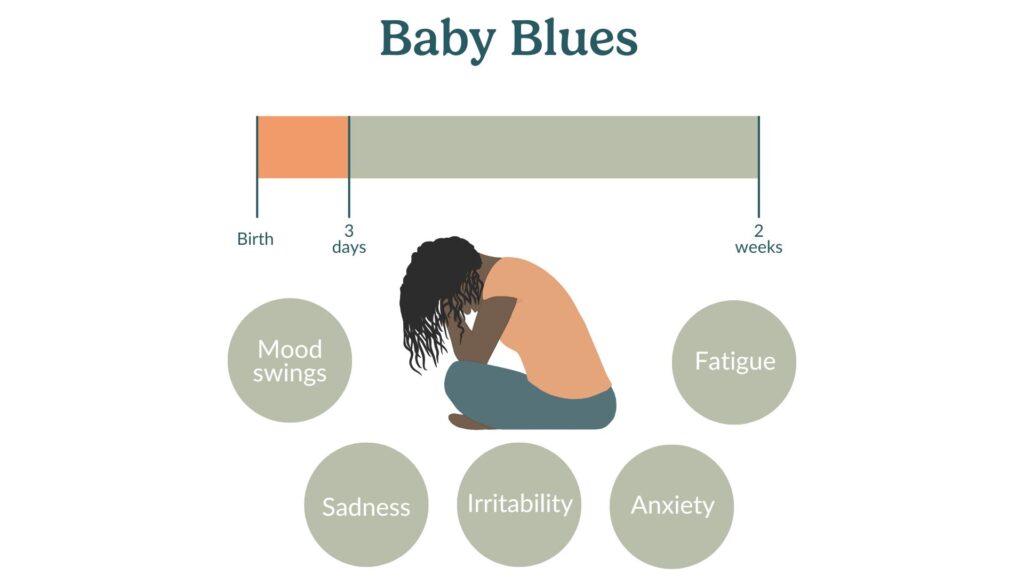baby blues

Baby blues
Baby blues refer to a common, temporary emotional state that many new mamas experience after giving birth. This period is characterized by mood swings, feelings of sadness, anxiety, and fatigue. The baby blues typically begin a few days after delivery and can last for up to two weeks. If you still aren’t feeling like yourself after two weeks postpartum, discuss the possibility of postpartum depression with your healthcare provider.
Understanding and managing baby blues is important for your emotional well-being during the postpartum period.
What to watch out for
It’s important to recognize the signs of baby blues and know how to manage them. Here are some common symptoms and tips:
- Mood swings: You might experience sudden changes in your mood, feeling happy one moment and tearful the next.
- Sadness: Feeling down or overwhelmed is common, even if you are also experiencing joy with your new baby. Weepiness is common in mothers experiencing the baby blues.
- Anxiety: You may feel anxious or worried about your ability to care for your baby, or about your baby’s wellbeing.
- Fatigue and Insomnia: Feeling extremely tired or having trouble sleeping, even when your baby is asleep.
- Irritability: You may become easily irritated, experience more frustration with your partner, or have difficulty coping with everyday tasks, especially decision-making.
- Postpartum Depression: If your mood swings, sadness, and other symptoms persist past two weeks postpartum (or if you still just don’t feel like yourself), it is likely you are experiencing postpartum depression (PPD). PPD is a treatable condition but can affect your early days of motherhood if you don’t have the proper support. There are many breastfeeding-friendly medications that can help with this condition, and postpartum therapy has also been shown to be useful in treating PPD.
To manage baby blues, try these tips:
- Rest: Get as much rest as you can. Sleep when your baby sleeps, avoid staying up late scrolling, and ask for help from family and friends. These first few weeks postpartum should be filled with lots of time in and around your bed relaxing – other family members and support systems should ideally help cover household chores and cooking more than usual at this time.
- Talk about your feelings: Share your feelings with your partner, friends, or a support group. Talking about your experiences can help you feel less isolated.
- Eat well and hydrate: Maintain a balanced diet to help keep your energy levels up and support your overall well-being. If friends or family ask how they can help, an easy reply could be, “Thanks! Could you drop off dinner for us on Tuesday evening?”
- Gentle movement: Light activity, like walking outdoors for a few minutes or gentle stretching, can help improve your mood and reduce stress.
- Take time for yourself: Make time to relax and do things you enjoy, even if it's just for a few minutes each day.
Physical limitations or health circumstances
Certain conditions can increase the likelihood of experiencing baby blues:
- Hormonal changes: The rapid drop in estrogen and progesterone after childbirth can affect your mood.
- Sleep deprivation: Caring for a newborn can lead to significant sleep loss, which can contribute to feelings of sadness and irritability.
- Stress: The new responsibilities and adjustments that come with having a baby can be overwhelming.
Breastfeeding-related information
Breastfeeding can sometimes be challenging, especially if you are experiencing baby blues. Here are some tips to help you manage breastfeeding during this time:
- Seek support: Connect with a lactation consultant for personalized advice and support. They can help increase your confidence and help you troubleshoot any breastfeeding difficulties. You can schedule a consultation here.
- Stay hydrated: Drink plenty of water to stay hydrated, which is essential for maintaining your milk supply.
- Eat nutritious foods: A balanced diet can help you feel better physically and emotionally, and support your milk production.
- Rest when you can: Sleep when your baby sleeps to help combat fatigue.
- Use nipple balm: We advise against using lanolin-based creams; instead, use nipple balm to soothe and protect your nipples.
Other terms
Understanding related terms can help you better manage baby blues and postpartum challenges:
- Postpartum depression: A more severe and long-lasting form of depression that can occur after childbirth. It requires medical treatment and support. Learn more about the symptoms of postpartum depression.
- Hormonal changes: Fluctuations in hormone levels that can impact mood and emotional well-being.
- Sleep deprivation: Lack of sleep, which can affect your physical and emotional health.
- Support system: Family, friends, and professionals who can provide emotional and practical support during the postpartum period.
- Self-care: Activities and practices that help you maintain your health and well-being, such as rest, nutrition, and relaxation.


